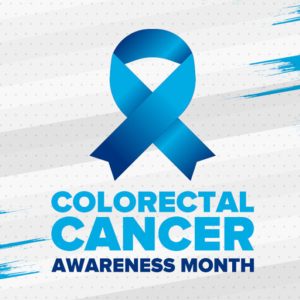
March is National Colorectal Cancer Awareness Month. This is an important time to raise awareness and to promote prevention strategies. Colorectal cancer starts in the colon or the rectum. Most colorectal cancers start as a growth on the inner lining of the colon or rectum, these growths are called polyps. Not all polyps turn in to cancer, but depending what kind they are, some will change into cancer over time. Therefore screening for, and removal of polyps is very important in the prevention of colorectal cancers.
Colorectal cancer is the third most common cancer diagnosed in men and women in the United States. The American Cancer Society estimates is 2022 there will be 106,180 new cases of colon cancer and 44,850 new cases of rectal cancer diagnosed. Due to colorectal cancer screenings and positive lifestyle changes, the rate of people diagnosed with colon or rectal cancer has dropped each year since the mid-1980’s. This decrease in occurrence was found mainly in older adults. Unfortunately, there has been a rising incidence of colorectal cancers in younger adults since the mid-1990’s.
Some key symptoms of colorectal cancer to look for are:
- A change in bowel habits, such as diarrhea, constipation, or narrowing of the stool, which lasts for more than a few days •
- A feeling that you need to have a bowel movement that is not relieved by having one •
- Rectal bleeding
- Blood in the stool, which may make the stool look black
- Cramping/abdominal pain
- Unintended weight loss
Many colorectal cancers can be prevented through regular screening. Screening can find precancerous polyps so that they can be removed before they turn into cancer. The American Cancer Society recommends that people with average risk of colorectal cancer start having regular screening at the age of 45.
You are at average risk for colorectal cancer if you do NOT have the following:
- A personal history of colorectal cancer
- A family history of colorectal cancer
- A personal history of ulcerative colitis or Crohn’s disease
- A personal history of radiation to the belly or pelvic area
If you meet any of the above criteria, you are at higher risk, and recommendations are different and more stringent. In this case, a plan should be made for appropriate screening measures with your physician. Screening can be done with stool-based tests that look for signs of cancer in a person’s stool OR with a visual exam that looks at the colon and rectum. The visual exams seem to be what are most used for screening and include a Colonoscopy and Flexible Sigmoidoscopy. A flexible sigmoidoscopy is a procedure that allows your doctor to look at the rectum and lower colon through a thin, flexible, lighted tube that has a camera at the tip of it. This allows the physician to check for polyps or cancer. The flexible sigmoidoscopy is recommended to be done every 5 years. A colonoscopy is a procedure that allows your physician to look at the rectum and the entire colon through a thin, flexible, lighted tube that has a camera at the tip of it. With a colonoscopy, the physician can find and remove polyps and some cancers. This test should be done every 10 years. Regular colorectal cancer screenings should be done through the age of 75. Screenings between the ages of 75-85 should be determined on a case-by-case basis with your physician, taking into consideration overall health and prior screening history.
Studies show the incidence of colorectal cancers and death from the disease has dropped for the past 15 years. It is believed that the decrease is due to polyps being found and removed before they become cancer. Screening is important because when found early, colorectal cancer is highly treatable. Talk to your healthcare provider about what tests might be a good option for you. The most important thing is to get screened!
The Montgomery County Health Department loves taking care of your family, and works every day to protect, promote and improve health in our community.
To learn more, call 573-564-2495 or visit us on Facebook.
